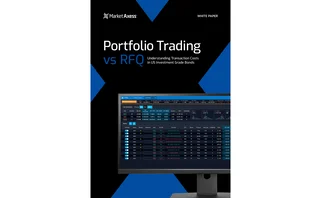Aggelos Andreou: When Social Responsibility Becomes an Investment Strategy

I am going to take you to an ideal world, where investors, bankers, and asset managers, et al, are all human rights advocates. While I don’t expect anyone to be transformed into a Mother Theresa-type figure anytime soon, I am perhaps naïve enough to believe that something is slowly changing in the way people do business.
I’ve noticed an underlying tendency among fintech firms to raise social awareness within the corporate world by offering a number of social responsibility-oriented services. This trend is being driven by a developing interest from their clients at a tumultuous time when solidarity is severely tested.
In September, Thomson Reuters launched the first Diversity and Inclusion Index (D&I) running on its Eikon platform. The index presents the top 100 publicly traded companies with the most diverse and inclusive workplaces.
This move came as more than 1,400 investors globally have already signed the United Nations’ Principles for Responsible Investment. Speaking to Debra Walton, global managing director, customer propositions at Thomson Reuters, I got proof to support my hunch that social responsibility has indeed become an investment strategy.
Walton said that diversity and inclusion have become a performance issue since it is now proven that companies with a diverse workforce have, over a period of five years, produced better returns on equity, stronger operating profit margins and better dividend yields, as well as lower beta.
I am perhaps naïve enough to believe that something is slowly changing in the way people do business.
“Looking at environmental, social and governance (ESG) factors can help give the investor insights into company management and culture, which could not otherwise be detected using financial measures,” said Walton. “We see an opportunity for focused or ‘thematic’ sustainable investment products that can also provide competitive returns.”
Going Green
The Luxembourg Stock Exchange (LuxSE) unveiled the world’s first “green exchange” in October, a platform where investors can contribute to the fight against climate change or support other green projects and initiatives. To date, the exchange hosts more than 116 green securities with a total value of $45 billion.
According to the LuxSE, interest has been more than satisfying, despite strict rules. A security listed on the exchange is automatically disqualified if it falls into certain categories, such as nuclear production, animal testing for non-medical products, medical testing on endangered species, or if it’s classified as a fossil fuel.
Reading through the press coverage on the exchange, I stumbled on an opinion article arguing that investing in the environment is an easy win since the political implications are minimal. As a political argument, that might be correct, but the author completely ignored the fact that renewable energy and especially wind and solar power, is one of the most popular energy investments right now.
Social responsibility is the central theme of US-based software provider Impact Labs. In September, it announced the launch of the first algorithmic portfolio software solely for those who actively adopt ESG investing.
By definition, users are not allowed to buy or sell securities by weapons manufacturers or other organizations related to violence and war. However, they’re free to trade thematically. For example, if someone cares about LGBTQ rights or the humanitarian crisis in Yemen, then they could choose to trade blocks of shares from different companies and organizations that the algorithm deems relevant.
The mastermind behind this software is Jason R. Escamilla, who has an extensive history in investment management. He says the financial community is more than open to walk down that path and spread investments throughout social projects.
The question now is how much of this “ideal world” will be integrated to everyday practices. The turning point will be when fintech firms understand that they have a lot to gain by offering the most relevant products in the market, while convincing investment firms to follow suit and adopt them.
Only users who have a paid subscription or are part of a corporate subscription are able to print or copy content.
To access these options, along with all other subscription benefits, please contact info@waterstechnology.com or view our subscription options here: http://subscriptions.waterstechnology.com/subscribe
You are currently unable to print this content. Please contact info@waterstechnology.com to find out more.
You are currently unable to copy this content. Please contact info@waterstechnology.com to find out more.
Copyright Infopro Digital Limited. All rights reserved.
As outlined in our terms and conditions, https://www.infopro-digital.com/terms-and-conditions/subscriptions/ (point 2.4), printing is limited to a single copy.
If you would like to purchase additional rights please email info@waterstechnology.com
Copyright Infopro Digital Limited. All rights reserved.
You may share this content using our article tools. As outlined in our terms and conditions, https://www.infopro-digital.com/terms-and-conditions/subscriptions/ (clause 2.4), an Authorised User may only make one copy of the materials for their own personal use. You must also comply with the restrictions in clause 2.5.
If you would like to purchase additional rights please email info@waterstechnology.com
More on Trading Tech
IPC’s C-suite shuffle signals bigger changes for trader voice tech
Waters Wrap: After a series of personnel changes at the legacy provider, WatersTechnology examines what these moves might mean for the future of turrets and trader voice.
WatersTechnology latest edition
Check out our latest edition, plus more than 12 years of our best content.
From no chance to no brainer: Inside outsourced trading’s buy-side charm offensive
Previously regarded with hesitancy and suspicion by the buy side, four asset managers explain their reasons for embracing outsourced trading.
Band-aids vs build-outs: Best practices for exchange software migrations
Heetesh Rawal writes that legacy exchange systems are under pressure to scale to support new asset classes and greater volumes, leaving exchange operators with a stark choice: patch up outdated systems and hope for the best or embark on risky but rewarding replacement projects.
Portfolio trading vs RFQ: Understanding transaction costs in US investment-grade bonds
The MarketAxess research team explores how such factors as order size, liquidity profiles and associated costs determine whether a portfolio trade or an RFQ list trade is the optimal choice.
IEX, MEMX spar over new exchange’s now-approved infrastructure model
As more exchanges look to operate around-the-clock venues, the disagreement has put the practices of market tech infrastructure providers under a microscope.
The Waters Cooler: The Thanksgiving debrief
Maybe we shouldn’t use AI for EVERYTHING! I’m talking to YOU, Spotify!
LSEG shelves replatforming project for FX Matching venues
After EBS migration, dealers had little appetite for another major technology project








